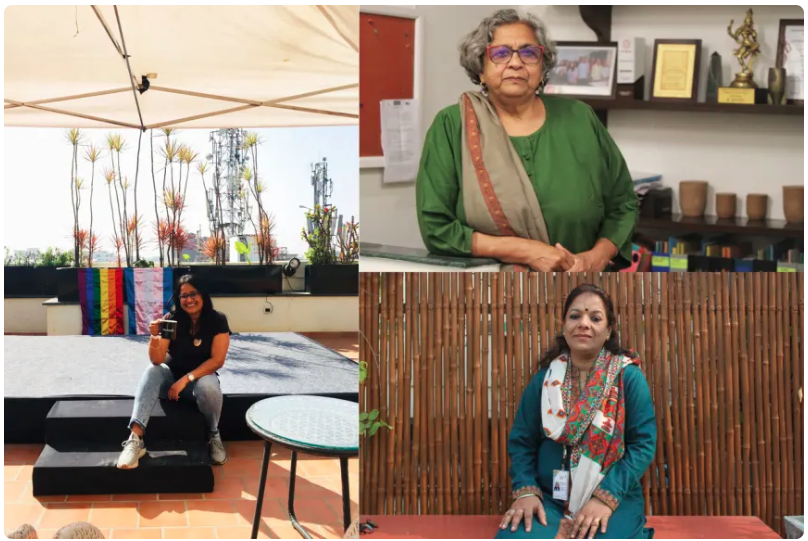Three HIV activists from India share their journeys and talk about what they hope the future of HIV care looks like in their country.
June 12, 2024 – TheBody.
by Bilal Kuchay

In India, HIV activists work tirelessly to end stigma and bring awareness to the country. Activists Mona Balani, Anjali Gopalan, and Jyoti Dhawale have dedicated decades to HIV awareness in India and offering peer support to individuals living with HIV.
In interviews with TheBody, these three HIV activists shared insights into their journeys and the experiences that have shaped their activism. The trio also talked about what has changed and what needs to change regarding HIV in India.
Mona Balani
In 1999, Mona Balani's husband, Chandra, tested positive for HIV. Two days later, she was also diagnosed with HIV. "We were shattered," she said.
Chandra was working as a salesman, earning around $300 a month. His illness meant less work and less income for the household. Mona, 48, said that even though the government was giving financial assistance monthly to people living with HIV, she was concerned about the high costs of treatment. "Per day, medicine was around INR 4000 ($48) to INR 5000 ($60) because he was supposed to take a bulk of medicines," she said.
In 2000, Chandra was diagnosed with tuberculosis in his lung, and his condition over the years kept deteriorating, forcing Mona to stop her own medication and use every penny for her husband's treatment.
As there was a lot of stigma attached to HIV, talking about it to family members wasn't easy. "We were very nervous to tell our families because a lot of shame and guilt was associated with [HIV] back then," she said.
After her husband started falling sick frequently and was admitted to the hospital on a regular basis, they finally broke the news about their HIV status to their family. And soon everyone started abandoning them. "Even if [family members] would visit us, they wouldn't even drink water in our house and would sit at a distance. It gave a lot of depression to my husband, and he was worried about me and our two sons," said Mona.
After battling HIV and tuberculosis for years, Chandra died in 2005. Mona's condition started worsening just a few months after her husband's death, and she was diagnosed with tuberculosis just a few months later. "I was losing weight drastically. I was losing my appetite. I was not able to walk even after taking a few steps. I was reduced to bones and skin. My weight was just 30 kg (66 lbs), "she said, adding that she was still looking for a job despite her condition. "People would tell me to just go home and rest."
Mona continued to struggle financially and took different jobs to support herself and her sons until she was hired by Alliance India, a nongovernmental organization working to prevent HIV and AIDS in the country. Today, Balani is one of the leading voices on HIV/AIDS prevention in India and is currently the program manager for community system strengthening at the organization.
Jyoti Dhawale
Jyoti Dhawale, 48, is a global ambassador for The Well Project, a nonprofit organization with a mission to change the course of the HIV/AIDS pandemic through a focus on women and girls across the gender spectrum.
At the age of just three, Jyoti was diagnosed with bilateral sensorineural hearing loss, which has impacted her speech. When she was diagnosed with HIV in 2005, she was surprised because she didn't have any symptoms except for a minor fever that she thought was a "normal" fever. "I always lay an emphasis on getting tested. The only way to know is to get tested," she said.
Like Mona, Jyoti's life took an ugly turn after her diagnosis because it led to her being ostracized by her friends and family, and her marriage dissolved at a time when she said she needed the support of her husband the most. Her child was also taken away from her. "I became homeless, left to support myself," she said. "That was the lowest point in my life."
However, she said she was without a goal or a purpose until she was diagnosed with HIV, and it changed her entire life. "In fact, it was a blessing in disguise. The pains that I went through finally had a purpose," she said, adding that she came out of the closet about her HIV status and armed herself with knowledge. "The more I knew, the more I wanted to know. Knowledge empowers you, and it makes you strong enough to face the world," she said.
For almost a decade and a half, Jyoti has traveled throughout India and many African nations as well, holding rallies to raise awareness and talk about the sexual health of women living with HIV. She also has worked with doctors to educate and empower people living with HIV about how they can take better care of themselves. Continue reading on TheBody...




